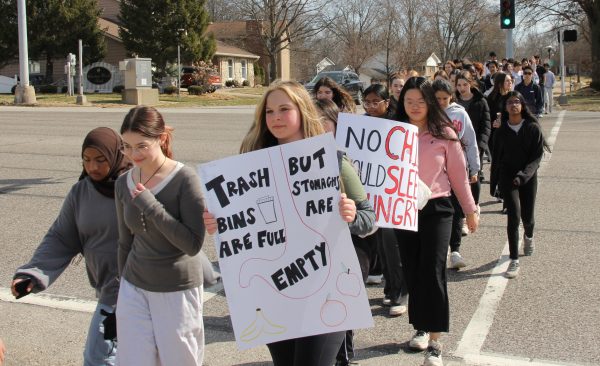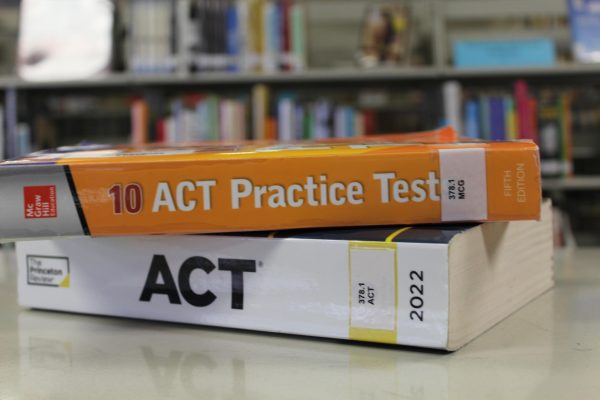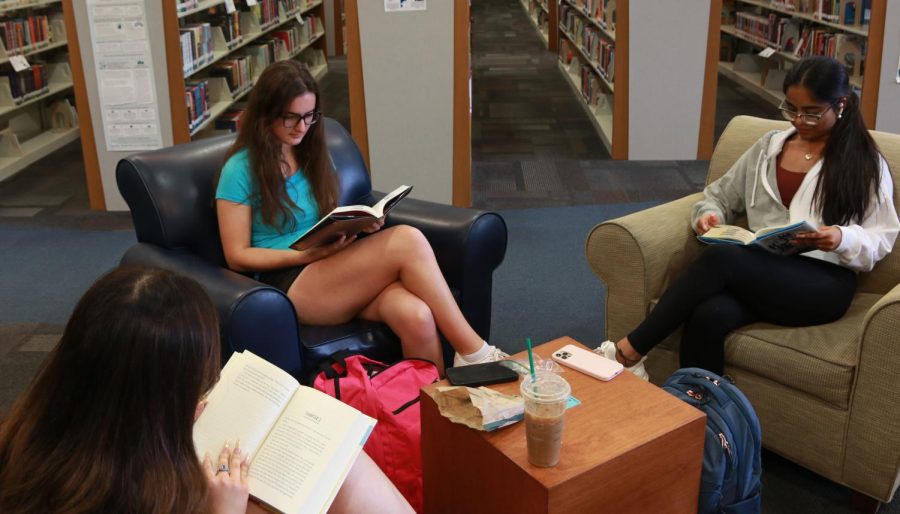Missouri House Proposes Legislation that May Defund Public Libraries
Media by Willem Hummel
Meghan Harman (Bottom Left), Mary Fumasi (teal shirt) and Manogna Yalamuri (white shirt) read in the library.
Joseph Schoedel’s kids like to play with the interactive features of the St. Louis County Library.
“My son loves buildings where you can make the ball go back and forth, and they love playing with the scarves that go through the tubes,” Schoedel said. “They don’t even realize they are using some analyzing skills by changing this, changing that and getting stuff where they want it to go, so it’s certainly an educational tool masked as fun.”
Schoedel said whenever they visit the library, he always makes sure his kids leave with a book in hand.
But Schoedel said the library is used for more than just books.
“There are workshops in the summer where they are building LEGO, and guest speakers can come in and read stories that my kids have heard and we read at home” Schoedel said, “That makes them want to listen to the actual author, makes them want to build lego.”
Schoedel is one of many people in the community who have a connection with the public libraries in the area and one of the people who may be affected if Missouri public libraries are defunded.
Ashley Bryant, director of the Maplewood Public Library, said there are multiple bills being debated in the General Assembly of Missouri regarding the zeroing out of funding for state libraries.
“One will prevent us from purchasing items for our Library of Things collection, another will allow library users to sue the library if we have material they deem inappropriate, yet another will allow the county government to essentially overthrow local library boards, and so on,” Bryant said.
Bryant said librarians have been accused of wanting to put “pornographic” material in the hands of children, but she said this is simply not the case.
“By speaking out against these things, we are standing up for your freedom to read and preventing the slippery slope that will surely follow if this legislation is passed,” Bryant said. “Libraries do not have pornographic material, and will never have pornographic material. Period. What we’re seeing challenged are books pertaining to LGBTQ+ issues, critical race theory, etc.”
Bryant said if they lose state funding, it will result in a decrease in new materials and a decline in the library’s ability to provide programming to the community.
For the Maplewood Public Library, which does not get a majority of its funding from the state, losing state funding would not be catastrophic to the library’s function, but Bryant said some libraries may not be so lucky, and likely would need to cut open hours or decrease their amount of employees.
This defunding resulted from a series of events involving a Senate bill 775 passed in August.
“It said that if an adult in a school gives a book to a child that has sextually explicit image, they could be charged with a class A misdemeanor,” Brittany Sharitz, MHS librarian, said.
This resulted in Missouri schools having to go through their library collections to make sure their books had none of this sextually explicit material, Sharitz said.
“Obviously, you wouldn’t think that we would have much sextually explicit content in the library because everything we have is for academic purposes” Sharitz said, “However, to give you one example, graphic novels of classic literature like ‘Handmaid’s Tale,’ it did have a couple of frames in the graphic novel where we could see what was described in the classic book itself.”
Sharitz said Rockwood ended up removing 22 books from its collection.
The (American Civil Liberties Union) ACLU of Missouri then brought a lawsuit against the Missouri government because they believed Senate bill 775 infringed on students’ First Amendment rights, Sharitz said.
In March, the House of Representatives passed that next year’s budget would remove all $4.5 million of funding for public libraries, Sharitz said.
While this may not affect the school library, it would certainly affect St. Louis County Libraries, which MHS does get programs from, Sharitz said.
“We just had a speaker come talk about the negro baseball league, he was from the public libraries,” Sharitz said. “Some of the public libraries even provide meals for students on free and reduced lunch throughout the summer. Because they are not at school they can’t get a free meal from school because it is summer break.”
Sharitz said some of the authors get in contact with MHS through the public libraries, and electronic databases and audiobooks are also provided by the public libraries. Access to these resources would be more uncertain if the state stops funding the libraries.
“Librarians do view themselves as protectors of intellectual freedoms, so whenever librarians feel like any individual, but especially our own students’ freedoms might be impacted, we do feel like someone should fight for those rights,” Sharitz said. “I do get concerned that some students don’t realize just how powerful a right it is to be able to read whatever you want to read.”
Your donation will support the student journalists of Marquette High School. Your contribution will allow us to purchase equipment and cover our annual website hosting costs. You may become a PATRON by making a donation at one of these levels: White/$30, Green/$50, Blue/$100. Patron names will be published in the print newsmagazine, on the website and once per quarter on our social media accounts.

Willem Hummel, Senior is a News Editor for the Marquette Messenger. This is his third year on staff, he has been involved in the Track Team, and Cross...







